London, UK – The UK Health Security Agency (UKHSA) has confirmed the first UK case of the mpox Clade Ib variant, a strain with potentially deadly effects. The individual, who recently returned from Africa, developed symptoms soon after their return and is now receiving specialized care.
The UKHSA has stated that the risk to the public remains low, with fewer than ten close contacts currently being traced. Mpox, a virus that spreads only through close personal contact, has prompted an extensive contact tracing effort to mitigate any potential spread.
In a statement, UKHSA advised healthcare professionals to remain vigilant for mpox symptoms, especially among recent travelers from endemic regions. The agency reassured the public that strict protocols are in place to limit transmission within healthcare settings.
The Clade Ib variant is rare but known to cause severe symptoms in some cases. As authorities monitor the situation closely, UK residents are encouraged to stay informed and report any mpox-related symptoms, such as fever, headache, and rashes, to medical professionals immediately.
Here are some key facts about mpox (previously known as monkeypox):
- Origin and Naming: Mpox was first discovered in 1958 in laboratory monkeys, which led to its initial name. However, the virus primarily circulates in wild animals, especially rodents, in Central and West Africa.
- Virus Family: Mpox is caused by the mpox virus, part of the Orthopoxvirus genus, which also includes variola virus (the cause of smallpox).
- Transmission: Mpox mainly spreads through close, prolonged contact with infected animals or people. Human-to-human transmission occurs via respiratory droplets, direct contact with bodily fluids, or contaminated materials like bedding and clothing.
- Symptoms: The infection typically begins with fever, headache, muscle aches, and exhaustion, followed by a rash that can look like pimples or blisters. These lesions usually start on the face before spreading.
- Clades and Severity: There are two main mpox clades: Clade I (Central African) and Clade II (West African). Clade I tends to be more severe and can have higher mortality rates, while Clade II, including its subvariant Ib, generally causes milder illness.
- Incubation Period: The incubation period ranges from 5 to 21 days, with most cases showing symptoms within 7 to 14 days after exposure.
- Vaccines and Treatment: The smallpox vaccine (like Jynneos or Imvanex) provides some protection against mpox, as the viruses are related. Antivirals such as tecovirimat are available in some regions for treating mpox in severe cases.
- Global Spread: Mpox has historically been limited to Africa but saw significant outbreaks in non-endemic countries in 2022. These outbreaks raised awareness of the virus and led to the World Health Organization (WHO) recommending the name change from monkeypox to mpox to reduce stigma.
- Public Health Response: Measures include isolation of confirmed cases, contact tracing, and public health advisories to educate on reducing transmission risk, particularly among people traveling to or from endemic areas.



